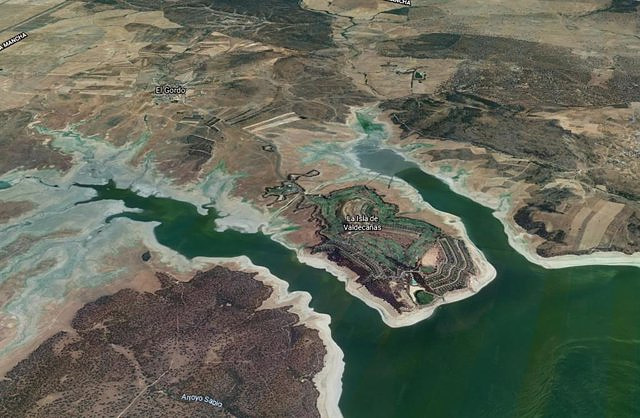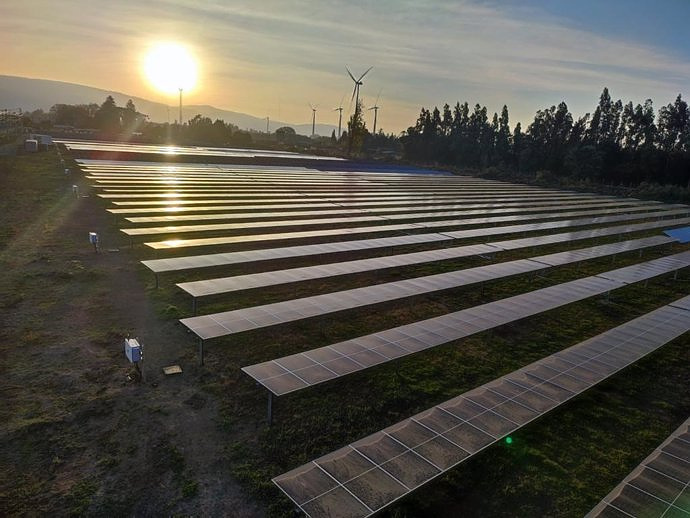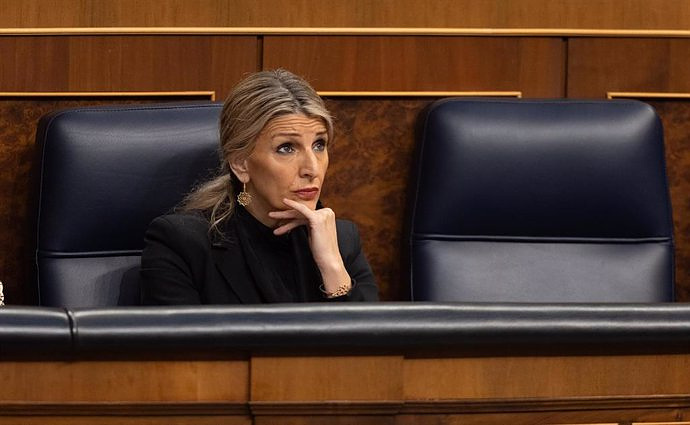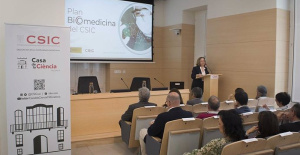The Constitutional Court will study the matter because it raises a legal issue of relevant social or economic repercussions
MADRID, 16 Nov. (EUROPA PRESS) -
The owners of 'Isla de Valdecañas', an urban complex located in Cáceres, in the municipalities of El Gordo and Berrocalejo, have shown their satisfaction this Wednesday after admitting to the Constitutional Court (TC) the amparo appeals filed against the ruling of the Supreme Court that ordered its demolition.
For the owners of the complex, the decision that the Constitutional Court has made "reinforces" their "conviction" that the Supreme Court "went beyond the question raised when ruling on the demolition" and could violate the right to effective judicial protection.
In addition, they advance that they are going to request "immediately" the precautionary measure of suspension of the Supreme Court ruling that agreed to the demolition of the complex and at the same time remember that they keep another judicial front open with an extraordinary appeal for review before the Supreme Court itself and focused in which the declaration of ZEPA zone (zone of special protection for birds) "was never carried out".
In a statement collected by Europa Press, the owners point out that the question that the Supreme Court had to analyze was limited "exclusively" to assessing whether or not there were causes of material impossibility raised by the Superior Court of Justice of Extremadura to carry out an alternative execution.
"The owners acted in good faith from the beginning and we will defend the survival of the complex until the end," they say, while saying they are "fully backed" by the "majority" support of the people of Extremadura.
In the opinion of the owners, what is "at stake" is a "sustainable" economic and environmental model for the autonomous community of Extremadura. They believe that the 'Isla de Valdecañas' has brought prosperity to the region, "in need of opportunities and resources to deal with depopulation."
The 'Isla de Valdecañas', they emphasize in the statement, contributes to local and regional progress, "invigorates the territory" and encourages the creation of "hundreds of jobs and services in the area."
As reported today by the court of guarantees, the Plenary has admitted the appeals raised by the Junta de Extremadura, the communities of owners and the municipalities of El Gordo and Berrocalejo. The three have alleged a violation of the right to effective judicial protection and the right to a process with all the guarantees.
The TC's decision to admit the appeals for processing will have the individual vote of the magistrates Juan Antonio Xiol Ríos, Ricardo Enríquez Sancho, María Luisa Balaguer Callejón, Ramón Sáez Valcárcel and Inmaculada Montalbán Huertas, the court specified.
The Plenary has appreciated that the issues raised in these amparo appeals have special constitutional significance. On the one hand, it has considered that they can give the court an opportunity to clarify or change its doctrine as a result of a process of internal reflection. And on the other, the magistrates have considered that the matter transcends the specific case because it raises a legal question of relevant and general social or economic repercussion.
The complex was the subject of two judgments of the Superior Court of Justice of Extremadura in 2011, in which the decision approving the project adopted by the Junta de Extremadura was annulled and the restoration of the land was ordered to the situation prior to the approval of said construction project, a decision that was upheld by the Supreme Court three years later.
In 2021, once the process was opened, the high court of Extremadura declared the impossibility of executing the sentences on its own terms and agreed to its partial material execution, which implied the demolition of everything that is in the structure phase or is not finished. and in operation, as well as the conservation of the hotel, homes, golf course and facilities that are currently built and in operation.
This year, the Supreme Court upheld an appeal presented, considering that there were no causes justifying the impossibility of executing the sentences on their own terms regarding the demolition of what was built and in operation as well.
It is precisely against this Supreme Court resolution that the three amparo appeals were filed, which the Constitutional Court admitted for processing this Wednesday.

 Exploring Cardano: Inner Workings and Advantages of this Cryptocurrency
Exploring Cardano: Inner Workings and Advantages of this Cryptocurrency Seville.- Economy.- Innova.- STSA inaugurates its new painting and sealing hangar in San Pablo, for 18 million
Seville.- Economy.- Innova.- STSA inaugurates its new painting and sealing hangar in San Pablo, for 18 million Innova.- More than 300 volunteers join the Andalucía Compromiso Digital network in one month to facilitate access to ICT
Innova.- More than 300 volunteers join the Andalucía Compromiso Digital network in one month to facilitate access to ICT Innova.-AMP.- Ayesa acquires 51% of Sadiel, which will create new technological engineering products and expand markets
Innova.-AMP.- Ayesa acquires 51% of Sadiel, which will create new technological engineering products and expand markets The Ibex 35 signs its best session of the year with an increase of 1.7% and recovers 11,000 points
The Ibex 35 signs its best session of the year with an increase of 1.7% and recovers 11,000 points RELEASE: Applied Intuition and Audi Partner on Unified AD Launch Solution
RELEASE: Applied Intuition and Audi Partner on Unified AD Launch Solution The European Parliament supports the new fiscal rules adapted to the situation by country
The European Parliament supports the new fiscal rules adapted to the situation by country Agreement between the Government and Navarra to protect traffic competition in the community after the annulment of the Supreme Court
Agreement between the Government and Navarra to protect traffic competition in the community after the annulment of the Supreme Court How Blockchain in being used to shape the future
How Blockchain in being used to shape the future Not just BTC and ETH: Here Are Some More Interesting Coins Worth Focusing on
Not just BTC and ETH: Here Are Some More Interesting Coins Worth Focusing on Looking for video games that value the neighborhoods of Valencia
Looking for video games that value the neighborhoods of Valencia UPV researchers improve the efficiency of air conditioning systems using a geothermal heat pump
UPV researchers improve the efficiency of air conditioning systems using a geothermal heat pump València is committed to citiverse and smart tourism to be "the reference technological hub of the Mediterranean"
València is committed to citiverse and smart tourism to be "the reference technological hub of the Mediterranean" Valencia displays its "innovative and technological potential" at the Emerge Americas event in Miami
Valencia displays its "innovative and technological potential" at the Emerge Americas event in Miami A million people demonstrate in France against Macron's pension reform
A million people demonstrate in France against Macron's pension reform Russia launches several missiles against "critical infrastructure" in the city of Zaporizhia
Russia launches several missiles against "critical infrastructure" in the city of Zaporizhia A "procession" remembers the dead of the Calabria shipwreck as bodies continue to wash up on the shore
A "procession" remembers the dead of the Calabria shipwreck as bodies continue to wash up on the shore Prison sentences handed down for three prominent Hong Kong pro-democracy activists
Prison sentences handed down for three prominent Hong Kong pro-democracy activists ETH continues to leave trading platforms, Ethereum balance on exchanges lowest in 3 years
ETH continues to leave trading platforms, Ethereum balance on exchanges lowest in 3 years Investors invest $450 million in Consensys, Ethereum incubator now valued at $7 billion
Investors invest $450 million in Consensys, Ethereum incubator now valued at $7 billion Alchemy Integrates Ethereum L2 Product Starknet to Enhance Web3 Scalability at a Price 100x Lower Than L1 Fees
Alchemy Integrates Ethereum L2 Product Starknet to Enhance Web3 Scalability at a Price 100x Lower Than L1 Fees Mining Report: Bitcoin's Electricity Consumption Declines by 25% in Q1 2022
Mining Report: Bitcoin's Electricity Consumption Declines by 25% in Q1 2022 Oil-to-Bitcoin Mining Firm Crusoe Energy Systems Raised $505 Million
Oil-to-Bitcoin Mining Firm Crusoe Energy Systems Raised $505 Million Microbt reveals the latest Bitcoin mining rigs -- Machines produce up to 126 TH/s with custom 5nm chip design
Microbt reveals the latest Bitcoin mining rigs -- Machines produce up to 126 TH/s with custom 5nm chip design Bitcoin's Mining Difficulty Hits a Lifetime High, With More Than 90% of BTC Supply Issued
Bitcoin's Mining Difficulty Hits a Lifetime High, With More Than 90% of BTC Supply Issued The Biggest Movers are Near, EOS, and RUNE during Friday's Selloff
The Biggest Movers are Near, EOS, and RUNE during Friday's Selloff Global Markets Spooked by a Hawkish Fed and Covid, Stocks and Crypto Gain After Musk Buys Twitter
Global Markets Spooked by a Hawkish Fed and Covid, Stocks and Crypto Gain After Musk Buys Twitter Bitso to offset carbon emissions from the Trading Platform's ERC20, ETH, and BTC Transactions
Bitso to offset carbon emissions from the Trading Platform's ERC20, ETH, and BTC Transactions Draftkings Announces 2022 College Hoops NFT Selection for March Madness
Draftkings Announces 2022 College Hoops NFT Selection for March Madness























